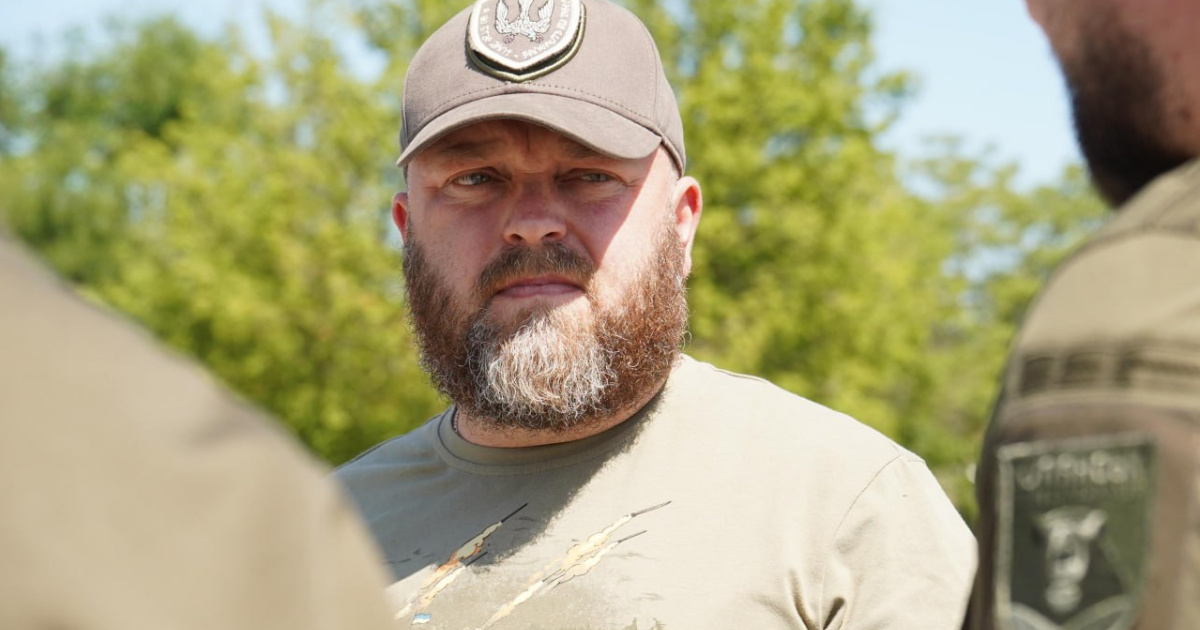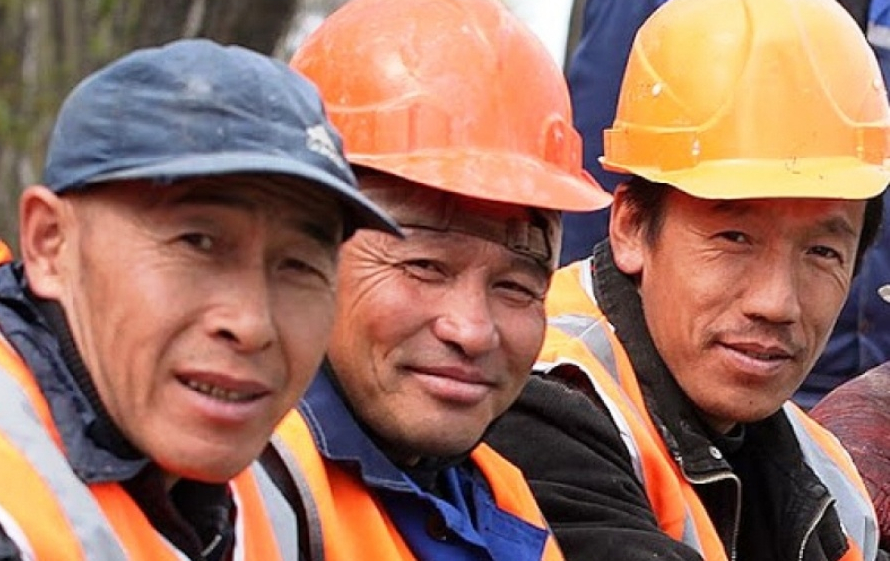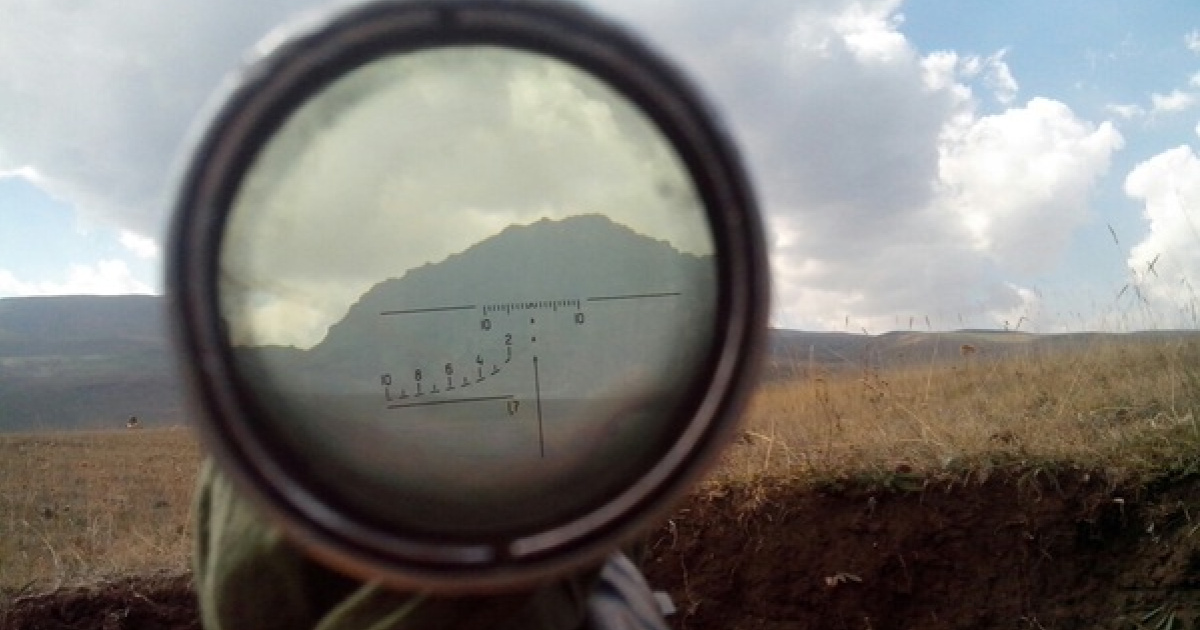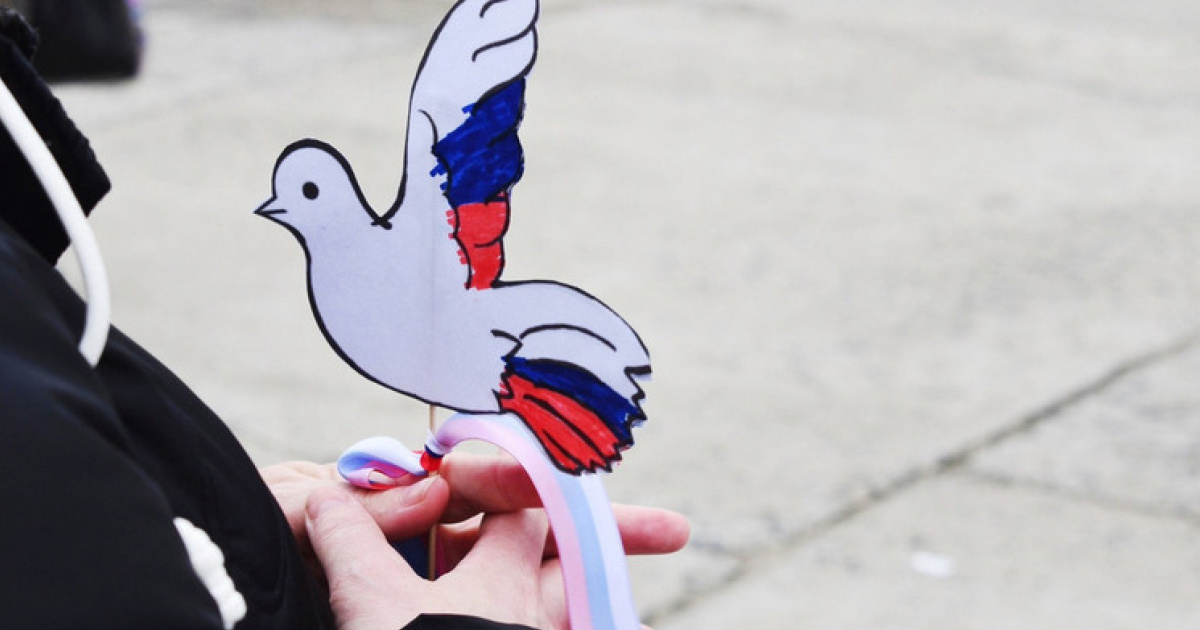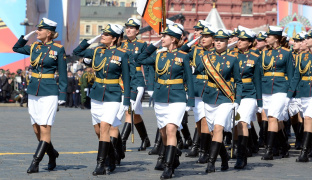The Russian media did not forget to remind-draw to their readers (each in its own way) last week how the "war in Ukraine" began three years ago. But the picture turned out to be compassionate, pessimistic and completely joyless. According to Moscow journalists, "militiamen" continue to fight at the front, and the junta, of course, is still sitting in Kyiv, and… that is all. Where are the palmy workdays and the same prospects of the Donetsk-Luhansk "republics"? The Russian media somehow tried to portray and concoct them, but it was not convincing at all…
"They allowed us to fight, but do not give a registration!"
The correspondent of Moscowsky Komsomolets visited Makiivka at the "annual meeting" of the "Sloviansk Brotherhood", or more simply, the gathering of militants who fought in Sloviansk three years ago.
"The meeting of the "Sloviansk residents" was held in the old culture center of the Butovka mine for a good reason – the authorities of the self-proclaimed republic forbade the community to hold a rally in one of the Donetsk parks just before. There is a cautious attitude toward the "Sloviansk residents" in Donetsk since 2014, which one of the fighters expressed by the phrase: "They allowed us to fight, but do not give a registration!", - the correspondent of MK writes.
"It is far, many could not come, some were not able to leave the units, and the connection was bad" - Anatoliy Khmelevoy, the main organizer of the holiday, explains. Khmelevoy was the deputy of the city council and the first secretary of the Sloviansk city committee of the Communist Party of Ukraine in 2014. Now he is the second secretary of the semi-forbidden Communist Party of the DPR. The party seems to have been registered in 2014, but it was not allowed to the elections. Khmelevoy is respected in the corps of Sloviansk residents. "Anatoliy has a large pension as a former deputy of the Ukrainian Supreme Council, so it happens that he will distribute it to the needy, when he himself has nothing to eat. He is uniquely the only person here, who is trusted by everyone!" - Vika whose family name and call sign I was again urged not to mention anywhere told about Khmelevoy", - MK notes.
The newspaper continues: "The leader of the Sloviansk residents lives in the hostel of the circus - very decent conditions by Donetsk standards. "Living costs $2.3 per day there, but discount was made for us almost four times thanks to the deputy speaker Olga Makeeva" - Khmelevoy told. Hostels are the most frequent place of residence of the "Sloviansk residents "in exile. They occupied the third and fourth hostels of the Donetsk National University in the summer of 2014. Many of them live there since then. Some of them managed to get settled in hostels in the center next to the local general staff, some - in the factory ones. They pay about $8.9 per month for the room, plus utility bills – it is impossible to rent housing in the city for such money".
The correspondent of MK states that "the lack of money and documents is the key bane of exiles": "Write about the Sloviansk residents! Many of them left without documents. They could not receive the DPR passport to the last. Now the authorities promise to define hostels that would give them address certificates for obtaining passports, but the matter has not moved forward. There is no work, no money, no status and pensions of disabled war veterans. It is a huge problem even with the receiving of ordinary pensions of the DPR without a local registration!" - I was persuaded by the same Vika".
The correspondent of MK gets acquainted with the "lieutenant who is on duty at the door": "Sergey is my name – he says. – I divorced my wife a long time ago, my daughter in Ukraine does not know that I am fighting. I am a Cossack from Sloviansk, I was everywhere – took the Don Regional State Administration in Donetsk on March 1, 2014, stormed the SSU in Luhansk in April, and then fought in Sloviansk… I have left the army a year ago and I cannot find a job. My brother in Russia cannot get citizenship for the third year, but sends money for which I live in a hostel. I know Slava Ponomarev, the "People's Mayor" of Sloviansk, well and I keep in touch with him, he sweats guts out in Moscow as a simple builder. I will probably come to Moscow by the end of April, they promise a job".
"…I get acquainted with commanders and fighters from Novoazovsk, Komsomolsky and Debaltseve at the last photography. There are active fighters and officers on prostheses. The well-known hear commander Yura "Machete" returns to his unit in Debaltseve. "It is quite here for now, there is a truce, but it will definitely begin in a couple of weeks. Do not listen to the cannonade near Mariupol. Nothing usually happens afterwards there where it is loud", - he explains with a laugh near the car", - MK concludes.
Gazeta.Ru dedicated a round-up article to the triennial of the outbreak of war, stating that "the beginning of armed hostilities against residents, as they were later called, of certain districts of Donetsk and Luhansk regions was a reaction to the seizure of state buildings in Sloviansk". At the same time, it does not specify who and why seized these buildings.
The edition recalls that "Ukrainian military were not ready to take part in large-scale military operations three years ago when Kyiv launched an operation in the east of the country: the army was not provided with uniforms, weapons and normal food, and the soldiers themselves never shot at the enemy".
"Law enforcement officials and local authorities managed to keep Mykolaiv, Odessa, Dnipro and Kharkiv for three years and also to release one of the largest industrial centers — Mariupol. At the same time, Ukraine still does not have an answer to the question of why the seizure of government buildings and arms rooms in the east of the country was allowed", - Gazeta.Ru plays the fool.
The edition reminds of the promises of Petro Poroshenko to turn ATO around for several hours and states that "Ukrainian army has faced several difficult situations over three years: the battle of Donetsk airport, battle of Ilovaisk, Debaltseve, Avdiivka, etc.".
"All this was accompanied by hysterical posts of social networks' users who often demanded to seize the territories of the unrecognized republics of the DPR and LPR by force", - Gazeta.Ru adds.
The edition draws a clear picture: the "militiamen" in the Donbass are opposed to Kyiv for the third year, Kyiv "repeatedly accuses Russia of supporting the unrecognized republics, Russia denies accusations and insists on direct talks of Ukrainian leadership with the heads of the DPR Igor (Alexander – Ostrov) Zakharchenko and LPR Igor Plotnitsky".
Gazeta.Ru notes that Ukraine and the "republics" "do not manage to achieve stable results" on cease-fire, "military actions in the east deter investors and prevent economic growth" "while crime has increased in the country at a record pace".
"…Ukraine cannot fulfill certain conditions, such as amnesty, because it will lead to mass protests inside the country", - Gazeta.Ru states.
"Reintegration will instantly bankrupt Ukraine, lead to the end of reforms, movement to the West, to democracy. Therefore, I am convinced that the removal of Donbass is useful for Ukraine which should develop itself as if the Donbass is not a part of the country", - American historian and publicist of Ukrainian origin Alexander Motyl stated in an interview with the Apostrophe Ukrainian edition. Similar sentiments prevail in Ukrainian society too. According to the Ilko Kucheriv Democratic Initiatives Foundation, 43% of Ukrainians scorn the holding of election in the Donbass", - the Kremlin edition states.
"Ukrainians no longer flee to Russia"
Kommersant writes about this trying to be objective.
"The chairman of the Civic Assistance Committee, the head of the Migration and Law Network Svetlana Gannushkina told that her organization is not aware of the arrival of new refugees from the southeast of Ukraine. "Basically, Ukrainians ask us for money for a return ticket from Russia, they come with other problems", - she reported. A citizen of the Donbass, who came to Russia with her daughter and granddaughter, applied to Civic Assistance at the beginning of the year. According to Ms. Gannushkina, they did not leave the country in the midst of military conflict, but "could not stand poverty, since the Donbass is starving". According to Civil Assistance, this is the only appeal of newly arrived citizens from Ukraine to the organization at the moment", - Kommersant writes.
The newspaper notes that, according to the Civil Assistance, now "598 people live in Russia with the status of refugee". "In most cases, it was received by the former employees of the Ukrainian "Berkut" and prosecutor's office", - Svetlana Gannushkina noted.
"According to Ms. Gannushkina, refugees from the Donbass will settle in Russia or return home. They are registered in territorial entities of the Russian Federation, with the exception of Moscow, the Moscow oblast, St. Petersburg, Chechnya and Rostov. "The authorities do not want to see refugees in these regions. We managed to ensure with great difficulty that at least close relatives of Muscovites from the Donbass were allowed to register in the capital", - Svetlana Gannushkina said, but noted that about 180 thousand Ukrainians were able to gain Russian citizenship according to the program of voluntary resettlement of compatriots".
"The Ministry of Internal Affairs of Russia reported that 234 301 Ukrainian citizens reside in Russia with the status of temporary shelter as of March 21. 15 314 people applied for the extension of temporary shelter, 149 were refused, 1 244 applications are being considered. 33 citizens of Ukraine applied to the territorial bodies of the Ministry of Internal Affairs on the issue of recognition as a refugee in 2017, one of whom received the status. The application for temporary shelter was written by 1 801 people, certificates were issued to 1 529", - the edition states.
"Yenakiieve Iron and Steel Works will start working on April 27"
Nezavisimaya Gazeta claims that "the authorities of the unrecognized republics of Donbass found a way out of the transport blockade" in the article titled "Unnamed friends will help Novorossia to launch factories".
"Yenakiieve Iron and Steel Works which stood idle because of the lack of raw materials will start working at the end of April. The management of the enterprise announced about the end of down time to the workers. The owners of factories in the Donbass, suspended from the management, threaten Russian suppliers of raw materials with new international sanctions…", - NG writes.
The newspaper claims that "a large number of information leaks means that things are still going on", referring to Russian supplies of raw materials to the factories of the Donbass, "grabbed" by the structures of the Russian Severstal.
"The deputy of the People's Council of the self-proclaimed DPR, Sergey Sverchkov reported the exact date of the start of work of Yenakiieve Iron and Steel Works on Facebook – April 27. "Raw materials are coming! Workers involved in the preparations for the launch of the plant were called out to work from Monday", – he reported", - the newspaper states.
It also states: "Russian railway personnel introduced a 25% discount on the transportation of iron ore from Cherepovets-II station (Vologda oblast) where Severstal's facilities are located to the Uspenskaya station in Rostov oblast, which is bordering with the Donetsk oblast. The same terms apply to the transportation of the same raw materials from the Kostomuksha-commodity station in Karelia (here are the JSC Karelsky Okatysh and Kostomuksha iron ore deposit, which are also owned by Severstal) to the Liski station in Voronezh oblast where the port on the Don River is located".
"The capacities of Russian MPPs will be enough for everyone", – the associate professor of the Faculty of World Economy and International Affairs of the Higher School of Economics Andrey Suzdaltsev assured NG. Severstal, for example, in 2016, shipped 14.9 million tons of iron ore to consumers.
"The prices for products are negotiable, so they may differ from market prices, but not significantly, – Andrey Suzdaltsev said. – It is unlikely that anyone will want to trade at a loss. I have not heard about any compensation from the Russian state... There is a problem that some of the Donbass enterprises compete with similar enterprises in Russia, as they worked in the same Russian market. We are talking, for example, about the production of large-diameter pipes".
"Attempts of Russian giants to deny these deals are understandable: they can easily fall under foreign sanctions, because Severstal exports products all over the world and does not want to run into a ban on deliveries”.
"From Ukraine such sanctions are meaningless, since the trade turnover between Russia and Ukraine is rapidly declining, but the European Union can theoretically supplement the already existing anti-Russian sanctions against Russian enterprises trading with the "separatists", – Suzdaltsev agrees. – But there are nuances here: firstly, until February of this year, the partners from Ukraine made excellent deals with the Donbass enterprises. Secondly, the blockade in itself violates the Minsk agreements, which include the humanitarian aspect as well. Sanctions against Russian partners of Donbass enterprises are violations of the Minsk agreements, since they doom the population to unemployment and poverty", – NG concludes.
"Let's try to compare the Ukrainian "visa-free" regime with Putin’s decree"
Komsomolskaya Pravda, which hates Ukraine, decided to compare the European "visa-free" for Ukraine and Russian regime for Donbass and immediately rushes to say that for Ukrainians "it is not that carefree even with "visa-free" regime".
"First of all, it is still not available. A positive decision should be taken on April 26 by the Committee of Permanent Representatives and the Council of Ministers of the EU. And the conditions on which Ukrainians can enter Europe will not be changed much, except they will not have to pay 35 euros for a visa", - the puzzled Komsomolskaya Pravda writes.
According to its version, "the problem, however, is that now you will need a special biometric passport and, as before, proof of the traveler's solvency and his intention to go back".
"The right to visit Europe for 90 days twice a year does not imply the possibility of working legally. In addition, the border guards may still require to show an invitation, confirmation of hotel reservation, return ticket, bank account certificate with a sufficient sum of money to secure staying in Europe, which is 50 euros per day", - the Moscow newspaper reminds and then confidently declares: "All these conditions make no difference, only one burdensome restriction in the form of 35 euros was removed for a small percent of wealthy Ukrainians, who were already able to travel to Europe freely".
"For the overwhelming majority of Ukrainians nothing changes, no victories, no faith in the European idea, their reaction is full of irritation, sadness, and even desperation. Some responses were posted on the Facebook page of my friend, writer and commander of the Donetsk special battalion Zakhar Prilepin. I will quote with preservation of all the features of the style: "Olena Snizhenko... I am very happy for 3 million of Ukrainians who have biometric passports. But I, unfortunately, do not belong to them. I, like millions of poor Ukrainians, have no money for anything. I cannot buy even socks, toothpaste and shampoo, I have 5 cents in my wallet and everything valuable is already in a pawnshop. Every morning I wonder how to live today. I do not care for your visa-free regime, because for me the main thing is to survive, not to fall into a hungry faint, to withstand deprivation with faith in God. And I personally do not care about this visa-free status, because I'm POOR and HUNGRY. I have no money and no future, I just SURVIVE", - Komsomolskaya Pravda correspondent quotes a certain "surviving" Olena, who cannot buy socks, but found money to pay for the Internet. Otherwise, how would she write her response?
"Let us try to compare the "visa-free" regime for Ukraine with the decree of Vladimir Putin, who legalized the passports and other documents of the unrecognized DPR and LPR, - KP continues. - There is no such certainty as with the European Union, because we do not know departmental instructions, which determine the status and possibilities of the LDPR documents. Nevertheless, being the holder of the passport of a citizen of the DPR, I tried to find out what I can do on the territory of Russia".
As a result, the correspondent of the KP asserts that "there are no problems with the border crossing at all" and says how it is damn pleasant to enter Russia without visa, having a passport of a "DPR citizen": "A lady in uniform, having checked my photo, fills in the data and indifferently throws the passport back into the tray. I pass the border. The next stage is the purchase of a ticket to Moscow in the Rostov airport. The same indifferent reaction. By the way, the DPR passport is very similar to the Russian one. It is of no interest to the lady who gives me a ticket... In Domodedovo Ramada Hotel near Moscow nobody was surprised as well. Thy checked me in within 5 minutes".
But the correspondent of Komsomolskaya Pravda honestly admits that "it is not yet possible to take out a loan in Russian banks, since the holder of the LDPR passport does not have any real security in Russia for the requested funds".
"Nevertheless, on the terms of confidentiality, I received information that Moscow is thinking about creating a special banking system for the Donbass. Then the possibility of obtaining loans and committing complex financial transactions will become quite real", - the KP correspondent says.
"This figure includes both killed and wounded in action..."
The newspaper Vzglyad was alarmed by the statements of the "ex-head of the republic" Alexander Khodakovsky about "50 irrevocable losses of Novorossia per day". The newspaper rushes to reassure that this is “not true”.
"That does not mean 50 deaths per day, but an average of 50 deceased fighters for various reasons", - the newspaper quotes "Russian volunteer, a militant of the DPR" Alexander Zhuchkovsky.
"He explained that this figure includes both killed and wounded in action, those who quit, those who died for "non-combat" reasons (domestic traumas and others). Zhuchkovsky drew attention to the fact that the figure of 50 people is given for both LPR and DPR. "If we talk about the killed in action, directly in combat and from shelling, this is an average of 3-5 people per day during periods of escalation", - Zhuchkovsky wrote”.
"He stated that "unfortunately, the daily tragedies have long turned into statistics, and the funerals of soldiers is the routine". "Alas, this is the feature of any protracted positional war", - the militant believes".
At the same time, the newspaper notes that Zhuchkovsky urged "not to underestimate the losses": "People should know what price we pay for independence from Ukraine and for (yet undying) hopes of returning to Russia. But we should not overestimate our losses, forcing the tense situation in the republics".
"Special checkpoints operate at the borders of the republics with Ukraine"
Izvestia argues that "Ukraine makes it difficult for residents of the LPR and DPR to enter its territory". The description of how "the procedure for obtaining a pass for crossing the line of demarcation lasts about a month", the newspaper for some reason illustrates by a photo of the many thousands crowd of the "DPR reservists". Of course, with such an illustration, the readers will think that "entry to Ukraine" is really a very "big problem".
"On the eve of the Easter holidays, Kyiv complicated the procedure for obtaining a pass for residents of the DPR and LPR to the territories controlled by Ukraine... As the deputy head of the people's Council of the LPR Vladislav Danego said in an interview to Izvestia, there is no understanding from the Ukrainian side. At the same time, the Verkhovna Rada stressed that one should not expect any relief from the Kyiv authorities in this matter. The government of Ukraine continues to adhere to the confrontational policy and is not looking for ways to resolve the situation in the Donbass", - Vzglyad said.
"Nowadays special checkpoints operate at the borders of the republics with Ukraine. However, the system for obtaining passes for residents of the DPR and LPR is extremely difficult and takes a lot of time… First, an online application is submitted, then it is checked by Ukrainian authorized bodies. The whole procedure takes from two weeks to a month. Such a regime creates great difficulties, especially for those whose relatives live outside the republics", - Vzglyad wrote.
Danego told that "we have not received any exact information on simplifying the passing system from the Ukrainian side. On our part, there was only one problem - weak through-flow rate due to lack of windows".
Ukrainian MP Yevhen Muraev told Izvestia that "we should not expect simplification of the system because the question of introducing a visa regime with the Russian Federation is being discussed".
"Obtaining passes is a very complicated procedure that takes much time due, among other things, to the fact that the number of transitions has been significantly reduced. In addition, the process of movement of residents of the LDPR is constantly becoming more complicated. The whole procedure is quite lengthy, complicated and humiliating", - Muraev said.
Yevhen Balitskyi, another Ukrainian MP, is also dissatisfied with the Kyiv authorities. "It is difficult to predict the actions of the current government, which is in agony. All the reforms lead only to worsening of the crisis. The Ukrainian government does everything to stay in power, relying on a radical electorate. It is very difficult to predict whether there will be a simplification of the access regime for unrecognized republics or not. At the moment, the Kyiv authorities lack any logic and common sense", - he told.
"By preventing residents of the DPR and LPR from visiting their relatives, the Ukrainian authorities only demonstrate their unwillingness to engage in constructive dialogue with representatives of the unrecognized republics, which casts doubt on the Ukrainian side's desire to resolve the crisis at all", - Vzglyad concludes.
Review by Mykhailo Karpenko, OstroV
